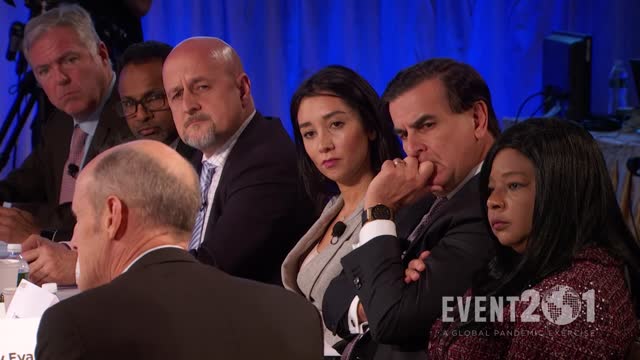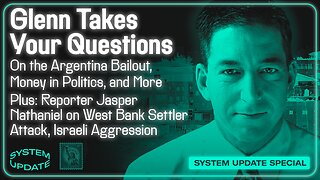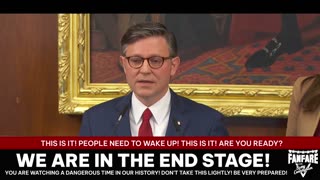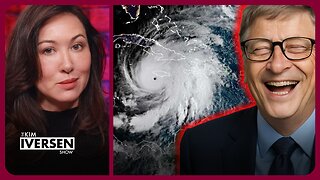Premium Only Content

Event 201 Pandemic Exercise Segment 4, Communications Discussion
About Event 201
Event 201 Media
#Event201
About the Event 201 exercise
Event 201 was a 3.5-hour pandemic tabletop exercise that simulated a series of dramatic, scenario-based facilitated discussions, confronting difficult, true-to-life dilemmas associated with response to a hypothetical, but scientifically plausible, pandemic. 15 global business, government, and public health leaders were players in the simulation exercise that highlighted unresolved real-world policy and economic issues that could be solved with sufficient political will, financial investment, and attention now and in the future.
The exercise consisted of pre-recorded news broadcasts, live “staff” briefings, and moderated discussions on specific topics. These issues were carefully designed in a compelling narrative that educated the participants and the audience.
The Johns Hopkins Center for Health Security, World Economic Forum, and Bill & Melinda Gates Foundation jointly propose these recommendations.
Purpose
In recent years, the world has seen a growing number of epidemic events, amounting to approximately 200 events annually. These events are increasing, and they are disruptive to health, economies, and society. Managing these events already strains global capacity, even absent a pandemic threat. Experts agree that it is only a matter of time before one of these epidemics becomes global—a pandemic with potentially catastrophic consequences. A severe pandemic, which becomes “Event 201,” would require reliable cooperation among several industries, national governments, and key international institutions.
Recent economic studies show that pandemics will be the cause of an average annual economic loss of 0.7% of global GDP—or $570 billion. The players’ responses to the scenario illuminated the need for cooperation among industry, national governments, key international institutions, and civil society, to avoid the catastrophic consequences that could arise from a large-scale pandemic.
Similar to the Center’s 3 previous exercises—Clade X, Dark Winter, and Atlantic Storm—Event 201 aimed to educate senior leaders at the highest level of US and international governments and leaders in global industries.
It is also a tool to inform members of the policy and preparedness communities and the general public. This is distinct from many other forms of simulation exercises that test protocols or technical policies of a specific organization. Exercises similar to Event 201 are a particularly effective way to help policymakers gain a fuller understanding of the urgent challenges they could face in a dynamic, real-world crisis.
Scenario
Details about the scenario are available here.
Recommendations
The next severe pandemic will not only cause great illness and loss of life but could also trigger major cascading economic and societal consequences that could contribute greatly to global impact and suffering. The Event 201 pandemic exercise, conducted on October 18, 2019, vividly demonstrated a number of these important gaps in pandemic preparedness as well as some of the elements of the solutions between the public and private sectors that will be needed to fill them. The Johns Hopkins Center for Health Security, World Economic Forum, and Bill & Melinda Gates Foundation jointly propose these recommendations.
When/where
Friday, October 18, 2019
8:45 a.m. – 12:30 p.m.
The Pierre hotel
New York, NY
Audience
An invitation-only audience of nearly 130 people attended the exercises, and a livestream of the event was available to everyone. Video coverage is available here.
Exercise team
Eric Toner, MD, is the exercise team lead from the Johns Hopkins Center for Health Security. Crystal Watson, DrPH, MPH and Tara Kirk Sell, PhD, MA are co-leads from the Johns Hopkins Center for Health Security. Ryan Morhard, JD, is the exercise lead from the World Economic Forum, and Jeffrey French is the exercise lead for the Bill and Melinda Gates Foundation.
Exercise team members are Tom Inglesby, MD; Anita Cicero, JD; Randy Larsen, USAF (retired); Caitlin Rivers, PhD, MPH; Diane Meyer, RN, MPH; Matthew Shearer, MPH; Matthew Watson; Richard Bruns, PhD; Jackie Fox; Andrea Lapp; Margaret Miller; Carol Miller; and Julia Cizek.
Event 201 was supported by funding from the Open Philanthropy Project.
-
 11:29
11:29
FactualNewsandInterviews
1 year agoSee how a psyop is concocted - FRIGHTENING
219 -
 13:54
13:54
Degenerate Jay
14 hours ago $1.15 earned5 Best Superhero Movies To Watch On Halloween
19.4K4 -
 59:03
59:03
NAG Podcast
7 hours agoSarah Fields: BOLDTALK W/Angela Belcamino
32.7K7 -
 1:21:41
1:21:41
Glenn Greenwald
10 hours agoGlenn Takes Your Questions: On the Argentina Bailout, Money in Politics, and More; Plus: Journalist Jasper Nathaniel on Brutality and Settler Attacks in the West Bank | SYSTEM UPDATE #541
87.6K46 -
 3:10:08
3:10:08
Barry Cunningham
7 hours agoPRESIDENT TRUMP TO USE NUCLEAR OPTION? FOOD STAMPS END! | SHUTDOWN DAY 31
52.7K38 -
 1:06:56
1:06:56
BonginoReport
15 hours agoThe Battle Between Good & Evil w/ Demonologist Rick Hansen - Hayley Caronia (Ep.168)
103K38 -
 1:12:57
1:12:57
Kim Iversen
10 hours agoBill Gates Suddenly Says “Don’t Worry About Climate Change”?
92.4K65 -
 1:05:12
1:05:12
Michael Franzese
10 hours agoI Waited 50 Years to Tell You What Happened on Halloween 1975
46.6K19 -
 1:07:15
1:07:15
Candace Show Podcast
10 hours agoINFILTRATION: Charlie Kirk Was Being Tracked For Years. | Candace Ep 256
95.8K396 -
 DVR
DVR
Rallied
9 hours ago $3.65 earnedWarzone Solo Challenges then RedSec Domination
43.4K8